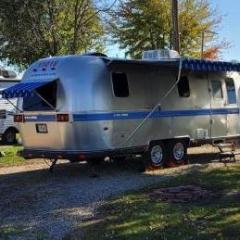-
Content Count
1997 -
Joined
-
Last visited
Content Type
Profiles
Forums
Blogs
Gallery
Everything posted by richard5933
-
On many engines they don't use a single-piece radiator hose - they have rubber hose on each end that make up the bend(s), and then the center straight portion is made of metal tubing of the correct diameter. Maybe something can be fabricated like this for your engine. What I don't understand is why the shop isn't being at least a little creative on this one. Usually these guys are pretty good at coming up with solutions to problems like this.
-
Two thoughts... The Schumacher chargers can sometimes be pretty basic units. The output in maintenance mode may only be a few amps, but it's the voltage output level that's most important as too high of a voltage for long-term storage can damage batteries. Why not just use the on-board battery charging system? If you only have a 15-amp outlet available where you store the coach, you can plug in with an adapter and then program your battery charging system to adjust to the lowered input. The Newmar battery management system has to be more advanced that the Schumacher. From this thread and the other similar threads, it sounds like some coaches have considerable draw on the house batteries even when the switch is in the 'off' position. Perhaps it would be wise to install a manual battery disconnect switch on the positive lead out of the battery bank for those times when it's desired to fully power the system down, such as when being stored without the ability to keep a charger powered on. Blue Sea makes some high-capacity switches which are very nice - I've got one installed immediately next to our battery bank and it gets used when a full shut-down is necessary.
-
I found a replacement for the crank reset button. I'll change it out and see how things go. Otherwise, this old generator might last us another season or more. I think that once I change out the fuel lift pump (low pressure pump) I'll have all the drips taken care of for now, at least until the next one pops up. Boy, do these old Perkins love to drip.
-
I'd be curious to learn what was drawing on the batteries despite your having disconnected them. Two weeks is awfully quick for batteries to go dead on their own.
-
You could also take a length of heater hose and slice one side of it open lengthwise - then just slip it over the positive bus bar and hold in place with some zip ties. Would add a measure of safety. If that were mine, eventually I'd drop something on it that would cause some fireworks.
- 26 replies
-
- solar
- monocrystalline
-
(and 1 more)
Tagged with:
-
There's a nice little campground just south of Rochester. We used it for a one-night stop on the way to Gillette WY last year. It's called AutumnWoods. Rochester is near Minneapolis, but much less congested and easier to get around.
-

Air suspension alarm on going off intermittently
richard5933 replied to kaelalynn's topic in Chassis
More unsettling is that you really won't know when you have an actual problem on your hands since you're becoming accustomed to hearing the false alarms. Do you have a mechanical gauge for your air system? Or some way to verify the actual pressure at the time the alarm is screaming at you? If you do and the pressure is holding at the proper level, then I'd suspect that you either have a failing sensor or a failing conductor/connector. You could have a wire which is separating from the connector on the end, and when you hit a bump or the suspension moves in a certain way it puts enough tension on it to separate the connection. The fact that your reading seems to jump back and forth when you have the issue leads me towards an intermittent connection problem. Perhaps you can check the connections/wiring again. Only this time, have someone watch the reading inside while you go outside and jiggle and pull on every wire and connector you can find that is related. Just be sure to stay safe if you have to get under the coach to do this by properly supporting the coach first. -

Travel on I-15 from Las Vegas to St. George Utah
richard5933 replied to wood6406's question in Destinations/Attractions
Ask most bus conversion owners about over heating and/or under powered engines, and the most common solution is to slow down, especially when driving up and down grades. With a rig that weighs 33,000 lbs, it may not be possible to always keep up with the cars on the road. -
That would be true if he dumps the front as well. Otherwise precautions are in order.
-
Seems to be a relay (1TS) with a heat coil in it. Three things can provide the ground connection to the relay: oil pressure sender, water temp sender, and CC relay. Checking with a Kohler shop on the east coast, I was told it could be a bad 1TS relay, bad CC relay, or bad sender. Only the senders are a available through normal retail channels.
-
It's great when something works out like this. This kind of repair is why we carry basic electrical repair parts/tools in our spares kit.
-
Riverbend - Welcome to the forum. When you get a minute please add a little information to your signature, like maybe a name and specs on your coach. What else did you have to change out when you went from AGM to lithium batteries? Was your charger/inverter/etc able to be reset to the lithium?
- 26 replies
-
- solar
- monocrystalline
-
(and 1 more)
Tagged with:
-
I've made some great progress on our generator, but there is still one issue left to resolve. I'm hoping that someone with more experience with these old beauties can help out. The generator is a Kohler 12.5RCOP67 spec 96562B powered by a Perkins. The generator is generally running fine. It puts out 120v @ 60hz, and the Perkins is running great now that I had the fuel injector pump rebuilt. The problem is that the cranking reset button pops after running it for a short while, as if the engine is overheating. The thermostat is new, the water pump has been replaced, the radiator is fine, and the unit will run for hours with temps steady at 160 degrees according to the gauge on the dash. Oil pressure seems to hold steady at 40+ and I’ve never seen it drop while the engine is running. I don’t think that there is an actual cooling problem or oil pressure problem with the engine, except for these momentary problems. Here’s what happened this past weekend – started the Perkins, it came to temp, ran at 160 degrees for about 10 minutes, then it shut down. I didn’t see the temp at the moment it shut down, but it had been fine just a few moments before. We had about a half-load on the generator when it shut down. Circuit breaker on gen controller never moved. I went to the controller and sure enough the red cranking reset button had popped out. Pushed it back in and the engine started right up and was at the proper temp. Ran for quite a while (an hour or so) after that with no problem. So, I’m wondering if the cranking reset button itself is going bad? Does this happen? Or is there some other issue which could cause the cranking reset button to pop out and shut down the generator.
-

No Electrical / Power Indicated Anywhere
richard5933 replied to kimenker's topic in Type A motorhomes
Have you tried to plug into another outlet at the house? If something tripped the GFCI breaker/outlet, you might have a problem with that outlet even after resetting it. If you are not plugged in, and with your generator off, do you have 12v power at all in the coach? You should still have 12v power when you're unplugged unless your batteries have gone dead. -
Eddy - Welcome to the forum! Please remember to not ever get under your coach unless it's properly blocked & supported. You don't want to be under there when the coach suddenly drops, and if you are having air suspension problems it's even more likely than normal. Leveling jacks are not considered to be proper blocking/support. Hopefully your manual shows you the proper support points.
-

Check engine & oil pressure light and guage
richard5933 replied to joepf's topic in Type A motorhomes
Have you cleaned and checked the connections? Sometime the problem can have a simple fix. -
Good point about testing under load...Ohm meter might read absolute 0 at rest, as there may be enough of a ground to the little current used by the Ohm meter. Try and start the engine, and things are much different. That might show where the fault is. I'd still want to do a thorough physical examination - I've seen too many cables that looked great but had considerable amount of the conductors rotted away inside the housing.
-
Is this the same pedestal you had trouble with back in April or are you at a new site now?
-
And don't just do a visual inspection of the ground straps/cables - give them a good tug to make sure that the inner conductor is still intact and not rotted out. There might be multiple ground straps/cables: between the battery bank and the chassis, between the engine and the chassis, and sometime between the transmission and chassis.
-
Glad it worked out well. Sounds like that break for a beer was all that you needed to get things back on track.
-
Hydraulic jacks are generally not accepted as a safety backup. Also important to remember is that you have to know where on the chassis to support the coach if you are going to place jack stands. You are not trying to support the axles or any part of the suspension - you are trying to support the coach chassis and body. There are specific points rated to support the chassis. Put the jack stands in other places and they might just punch holes in the floor of the coach as it drops down. Best bet is to call the chassis/coach support phone number and get specifics on where it's recommended that your specific layout be supported while you are underneath.
-

Difficulty climbing stairs in RV--Solutions??
richard5933 replied to mirogail's topic in General Discussion
Do you have good handrails on both sides of the steps? That would be my first thought. Of course, teaching the dogs to jump up on their own would probably help too. Maybe getting them a lightweight step would allow them to be on their own, leaving you free to use the handrails. -
The website for the fans is horrible now on the Dometic site compared to when it was independent. Not surprising they couldn't be any help. Didn't you get a remote for each of the fans?
-
Sounds like it's getting to the point where you have to weigh the cost of having the board tested against the cost of just replacing it and hoping that fixes it. Of course, first you'd want to run through all the other troubleshooting steps like RayIN mentioned about making sure all connections are clean and tight.
-
For us the 315s work well, except for the extra width which creates a rub point on full turns. That's the main reason we're going back to 12R22.5 as soon as the bank account allows.

